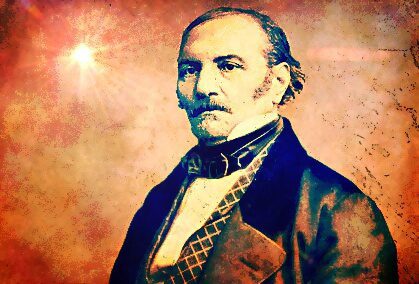Translations, from Portuguese, are automatic. If you notice any errors in the text, help us identify them, clicking here.
Subscribe to our Newsletters and receive our articles directly in your email.
We have two aspects currently defended by the spiritist movement: that Spiritism is a science and that it is a religion. Uniting these two aspects, some claim that it has a triple aspect: science, philosophy and religion.
First of all, we need to highlight that Spiritism can only be seen as religion in the philosophical aspect, and not in the ecumenical aspect.
And the fact that it is a religion in the philosophical sense, stated by Kardec, is directly linked to the fact that the Spiritist Doctrine is a development of Rational Spiritualism, a Philosophical Movement that outlined French moral sciences and teaching, in that country, for a large part of the 19th century.
If so, you will ask, is Spiritism a religion? Why, yes, without a doubt, gentlemen; In the philosophical sense, Spiritism is a religion, and we glorify ourselves for this, because it is the doctrine that founds the bonds of fraternity and communion of thoughts, not on a simple convention, but on the most solid foundations: the laws of Nature.
KARDEC, Allan. Revista Espírita, December 1868. Annual session commemorating the dead.
Spiritism, therefore, is not a religion as we currently understand it. This is precisely why Allan Kardec argues that the term should not be used, so as not to cause misinterpretations and not place Spiritism in a field in which it does not fit and where, ceasing to be science, it is defeated by the dispute between religions and between science and religion. No, this is neither appropriate nor deserved for this doctrine born of the scientific method and present in nature itself.
Why, then, have we declared that Spiritism is not a religion? Because there is no one word to express every idea, and because, in general opinion, the word religion it is inseparable from the idea of worship; because it exclusively awakens an idea of form, which Spiritism does not have. If Spiritism called itself a religion, the public would see nothing more than a new edition, a variant, if you like, of the absolute principles in matters of faith; a priestly caste with its procession of hierarchies, ceremonies and privileges; he would not separate it from the ideas of mysticism and the abuses against which public opinion has so often risen.
Since Spiritism does not have any of the characteristics of a religion, in the usual sense of the word, it could not and should not adorn itself with a title about the value of which people would inevitably have been mistaken. This is why it is simply said: philosophical and moral doctrine.
ibid.
Spiritism-Religion
Spiritism-religion hides, as a religion, in spiritist centers, just as other religions live in their churches and temples (there are even those who are already calling the spiritist center a “temple”). He does not practice evocations and blindly accepts what mediums or isolated Spirits say, or even what institutions such as the FEB – Brazilian Spiritist Federation determine. Spiritism-religion became dogmatic and left aside the doctrinal and scientific principles born from the long and exhaustive study of Allan Kardec. He buried his legacy, in large part, to be left with the most diverse false modern ideas, originating from mysticism, which he allowed to settle within his heart.

To be a follower of Spiritualism-religion, the individual is led to believe that it depends on leaving aside their own religion, because that is how it works in this sense. You can study mathematics or botany as a Catholic or evangelical, but that's not the case with a religion, right?
But, often, this sincere adherent, thirsty for knowledge, finds in Spiritism-religion nothing more than a new religion, full of dogmas. Sometimes, Spiritism-religion even becomes prejudiced and drives away new followers, by being categorical in pointing out people with certain characteristics and saying that they are like that because they would be paying debts from past lives, among other ideas that border on the absurd.
But this does not correspond at all to Spiritualism-science.
Spiritism-Science
Spiritism-science did not hide. Climbed in the strength of Rational Spiritualism, which was developed by Experimental Psychology, it spread like gunpowder, like any other science. It was not only accepted, but studied, in person, by people from the most educated layers of society. Princes, princesses, kings, queens, philosophers, scientists, doctors, doctors. It spread, as something purely clear and rational, among religious people of all faiths, finding, among its numbers, even orthodox Catholics and Muslims.
IV. ─ Regarding instruction:The level of education is very easy to assess through correspondence. Careful instruction, 30%; simple scholars, 30%; higher education, 20%; ─ semi-literate, 10%; ─ illiterate, 6%; ─ wise officers, 4%.
V. ─ Regarding religious ideas: Roman Catholics, freethinkers, not bound by dogma, 50%; ─ Greek Catholics, 15%; ─ Jews, 10%; ─ liberal Protestants, 10%; ─ Catholics linked to dogmas, 10%; ─ Orthodox Protestants, 3%; ─ Muslims, 2%.
KARDEC, Allan. Spiritist Magazine, January 1869. Statistics of Spiritism.
Ah! how wonderful and, at the same time, simple, Spiritism-science was. It was practiced in homes. Families carried out private evocations of their loved ones, and learned and comforted themselves from them. Sometimes, they evoked suffering Spirits, and helped them to calm down, with new understandings. They often sent the notes of these evocations to Allan Kardec, who analyzed them with the other SPEE associates. How many times have these particular evocations given rise to new hypotheses and new investigations!
Spiritualism-science was seen seriously. New doctrinal principles were not admitted without being verified by the double control method: the communication of the same principle everywhere, with these communications being evaluated in the light of logic and reason. Nothing was denied or accepted without carrying out this process. How many times has Kardec gone back and abandoned a hypothesis, seeing it as invalid in the face of the evidence?
In Spiritualism-science, the centers They were serious centers of study. They practiced evocations for the purpose of learning and, in the most serious cases, according to Kardec's precepts, neither neophytes nor curious people were admitted to mediumistic meetings.
Spiritism-science is needed. In it, Kardec found very clear and rational arguments to discard the most absurd and unfounded criticisms against Spiritism. Today, Spiritism-religion often loses followers to disbelief, because ideas born from blind acceptance cannot face reason.
We would do better if we didn't even talk about “Spiritism-religion”, but just about “Religious Spiritist Movement”, perhaps. But it is important to highlight the incongruity between the two concepts, as we need to make efforts to return to “Spiritism-science”, the one that everyone can study, without abandoning their religions; he who gives reasoned faith, who can face reason at any time; the one, finally, that didn't end with Kardec, and that needs to continue.
Spiritism-science finds its formation largely recorded in the Spiritist Magazine from 1858 to 1869, the result of exhaustive work of more than 12 years on spontaneous communications, evocations and manifestations of thousands of Spirits, by thousands of mediums, in thousands of groups, by all over the world. “Spiritism-religion” is predominantly found in novels, the result of the opinion of a Spirit, who does not question himself through the necessary method.
On the date on which Allan Kardec's birth is celebrated, I think we need to do much more to defend his legacy, which, far from being a religious creation to lead believers, encompasses the the entire community of incarnating Spirits on planet Earth. This legacy is bigger than me, than you, than our group. It does not and should not depend on anyone’s opinion. It needs to be recovered at its source. Here's the job.

Until the last moment of his physical existence, Allan Kardec left deep teachings. He died as he lived: working for Spiritism. His industrious hands said goodbye to this world delivering the Spiritist Magazine — a periodical in which he recorded his teachings, his struggles, his victories and, in that last moment, his immortality.
[…]
In the cemetery, the curious tried to position themselves in the places where they could listen to the speeches. However, when the coffin descended to the bottom of the grave, emotion silenced the words; there was a great silence.
PRIVATO, Simoni. The Legacy of Allan Kardec.
Reading Recommendations (Books)
- Free PDFs by Kardec – https://bit.ly/3sXXBxk
- Autonomy – The Untold History of Spiritism: https://amzn.to/3PIvbyy
- Allan Kardec's Legacy: https://amzn.to/3RIn2gv
- Final point – the reunion with spiritualism with Allan Kardec: https://amzn.to/48PLaE7
- Neither Heaven nor Hell – The Laws of the Soul According to Spiritism: https://amzn.to/3F2voYO
- Genesis – Miracles and Predictions According to Spiritism (unadulterated): Free PDF or https://amzn.to/3RM91hF
- Heaven and Hell: Or divine justice according to Spiritism (unadulterated): Free PDF or https://amzn.to/3ZGrcal
- Spiritist Revolution. Allan Kardec's forgotten theory: https://amzn.to/3t7HIUH
- Mesmer. The denied science of animal magnetism: https://amzn.to/3PYc1X2
- The Book of Mediums: https://amzn.to/3PDNTHK
- The Spirits' Book: https://amzn.to/3QkcFx9
- Spiritist Magazine – complete collection: https://amzn.to/48Uxh7s
- Practical Instructions on Spiritist Manifestations: https://amzn.to/3QiR8Gc
- Spiritism in its Simplest Expression: https://amzn.to/3M6fXT5


